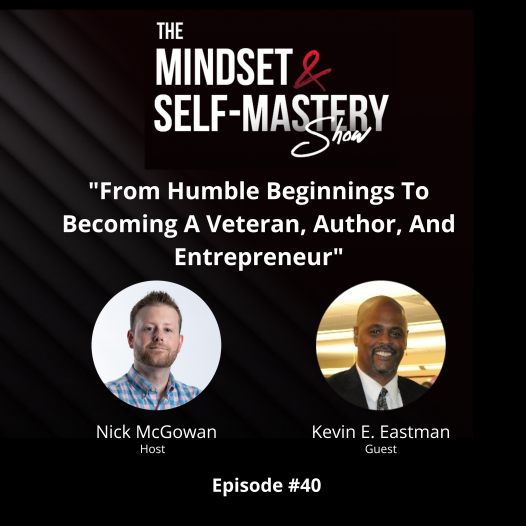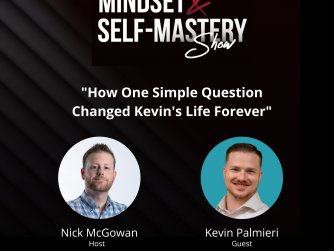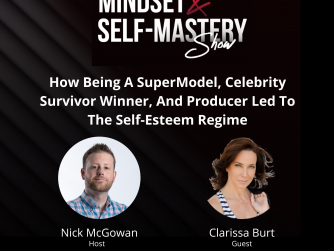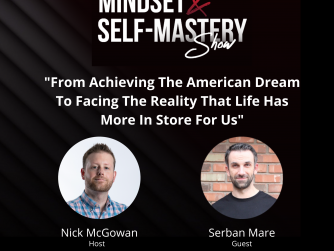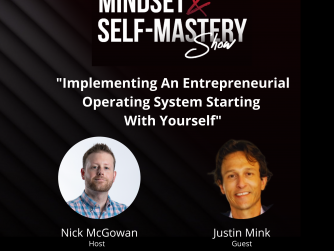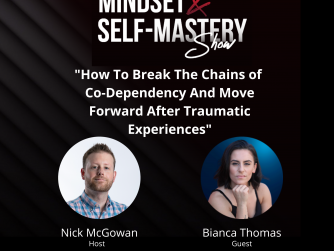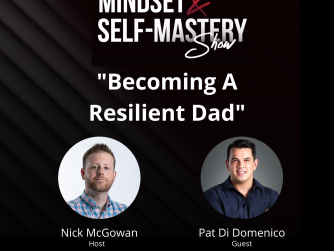Episode summary: Kevin E. Eastman was in the Air Force as a sergeant. He learned things such as how to best effectively get his message heard, and his supervisor really helped him open up perspectives on his life and mentality.
He used to be the type of person who blamed everyone else for all the problems and misfortunes. But it was pointed out that if you look at yourself, you can see how you are the creator of your own world. Even something as simple as fear.
Fear exists, but it’s because we create fear in thinking about something that may or may not even happen. With that type of awareness, we can overcome so much more.
Kevin ended up journaling to help put things in perspective so he can change his life around. While reading through his entries, he thought this is a great way to help others, so he organized his writings and turned them into a published book.
Guest Name & Bio: Kevin E. Eastman is an Air Force vet, community activist, and mentor, with a passion for helping others in achieving their goals. He has a fun, but passionate approach to helping people with their self-development. He had to lot of lessons, and he’s trying to do his part to help others.

EPISODE TRANSCRIPTION
0:08
Hello and welcome to The Mindset and Self-Mastery Show. I’m your host, Nick McGowan.
0:14
And on this show, my guests and I unpack the stories that shape us, the lives that we lead on our path to self-mastery.
0:22
So let’s not wait any longer. Let the games begin.
0:30
Hey, Kevin, welcome to the show. Man, it’s great to have you. How you doing? I’m good. Pleasure to be here.
0:35
Thanks for having me. Absolutely. Well, I appreciate you being on. I’m not going to lie to the audience here.
0:41
This is actually round two of you and I. Last time something happened. You know, technology is great when it works.
0:48
Kind of sucks at times when it doesn’t. But I’m a part of the group that you’re one of the moderators
0:53
for one of the admins for. I love the stuff that we get into in the group. And I really appreciate your authenticity within the group.
1:01
Like a couple of the posts you’ve had to post recently that are like, Maybe you people don’t understand this, but here’s how the rules work
1:07
and here’s how that stuff is. So I appreciate your for being, man. So why don’t you give us some context?
1:13
You kind of have to do that. You know, you want to be diplomatic as much as you can, but at some point you have to just be blunt and let people know.
1:21
It’s like, look, we have rules. We’re all adults. You know, you keep trying to push the envelope
1:27
and you’re forcing me to do things that I don’t need to do. You know, and if you can’t follow the rules, you got to go.
1:34
Yeah, that’s. It’s cut and dry. You know, I’ll be honest with you. I think you’ve got 15
1:40
or 16,000 people that are in the group, or maybe even more than that. I had a group for a little while that was small, a couple hundred people,
1:47
but I now am an admin for a group that’s about the same size as yours. And I see those things differently now.
1:53
I’m like, Oh yeah, there are certain things that you just no more. You’re out. That’s it. Strike one and you’re done.
2:00
Exactly. Exactly. You kind of have to have that that message that go through to
2:06
you know, for the majority of the people in the group, they do follow the rules. But there are a few that try to push the envelope.
2:12
And if you let that person do it, then another person will say, okay, if they did it, then I can do it. And then it just
2:18
then you’re right back to square one, so you kind of have to nip it in the bud. It’s like, look, you, you post cryptocurrency in this group,
2:25
you’re done is there is no this is the warning. I’m not saying it again.
2:31
Yeah. And just so the audience is clear, it’s not a financial group that we’re talking about where I crypto would make sense or something.
2:37
This is about mindset and positivity and really the stuff that we’re going to get into. So Kevin, give us some context.
2:45
What do you do for a living and what’s one thing that most people don’t know about you that’s maybe a little odd or bizarre?
2:50
Well, I’m retired from the military. I spent over 20 years in the Air Force,
2:56
a book writer. That’s what I’m doing, a business management consulting. And I try to do that a little bit
3:03
as a freelance business consultant to try to help people get to take their business to the next level.
3:10
Something that’s odd about me, I wouldn’t say out of bizarre, but I mean, a lot of things a lot of people don’t realize about me
3:16
that I was a drill instructor in the Air Force for three years. So I actually I tell people
3:23
in a joking way, I actually get a paycheck to have an attitude. And I was real good at it. So.
3:28
So it was fun, you know, in that sense, you know, a lot of people
3:34
don’t realize what a drill instructor actually goes through on a daily basis.
3:40
An interesting story. A lot of people, they tell me that I resemble Damon Wayans,
3:46
you know, the comedian. And and I was a drill and I was a drill instructor when the movie Major Pain came out.
3:55
So I had to spend time telling people I am not him.
4:01
Hmm. Yeah, that’s too good. I. I got to be honest with you, Kevin. I’m one of those people that look at people, and maybe it’s just how I learn,
4:08
but I tie them to, like, either an animal or who they remind me of. I think there’s probably only 8 to 10 different character types in this world.
4:17
I saw the resemblance with the Wayans family at one point, and I honestly thought I was like, know that’s that’s potentially racist.
4:24
Like, pull that back, Nick. But the fact that you pulled it up and that you the movie was out at the same time, I think I could see that it was
4:33
it came out and I’m sitting there like, no, that’s not me. I swear, that’s not me.
4:39
Well, man, especially you. 20, 25 years ago or whatever. Like, I could really see it.
4:45
I can’t see with the gray in there in that beard now. But that’s funny. Oh, man. So when I think of drill sergeants, I don’t really think of
4:54
Major Payne, but I think of like the crazy ones that are yelling. But then at the opposite side, I’m familiar with the Bob Ross story
5:02
where Bob Ross was a drill instructor and drill sergeant, and most people are completely shocked by that.
5:11
Well, there is a misconception about that. And what I would I tell people when I talk to them is
5:17
you don’t have to say things loudly to be effective. You can actually whisper something to somebody.
5:24
And if that person starts crying, you can walk out of the room without saying a word. I bet when you walk back in, everybody will know what you said, you know?
5:34
So it’s not a matter of how loud you say it. What I what I did when I was an instructor is I used yelling
5:40
as a timesaver, so to speak. I didn’t want to repeat myself 47 times
5:46
for the same thing, so I said it once very loudly. Unfortunately, there was somebody that was the the sacrificial lamb,
5:54
so to speak, you know, and, you know, 45 other people don’t want to go through what that person went through.
6:02
So I didn’t have to say it, but once. So that was kind of the way I did it. I wasn’t a big yeller
6:08
because I used my experience as a as a teenager growing up myself.
6:13
If your parents are yelling all the time and my parents didn’t yell all the time, but if you you hear that a lot, sooner or later, all you hear is yelling.
6:22
You don’t hear what they’re yelling, you know? And the person will say, well, what did they say?
6:27
I don’t know, tell me or something. You know, who’s yelling at something? So and that’s how I taught the instructors that I trained.
6:36
It’s like, you don’t have to yell all the time. You, you you have to be effective with what you’re doing.
6:42
So you have to be selective when you use the yelling part. So I didn’t do it all the time.
6:47
And I really appreciate you saying that. I, I feel like most all of our problems come from childhood trauma.
6:54
And what you’re saying with your parents not yelling, I actually grew up in a house where yelling was normal, at least
7:02
in my mom’s house, I guess my dad’s house, it was normal at different times. But I remember there would be like throwing of things, yelling.
7:11
And then years later, I got into relationships, specifically my my last marriage, that that didn’t work.
7:17
She just shut down. And I was like, I thought, this is how you did things. I thought, you yell and you throw things because of the trauma that I had growing up.
7:26
So how did you take that knowing, hey, I have to get my point across, but not translating that into,
7:33
you know, business and the career because I’m sure you don’t go and see your clients. You’re like, Hey, so if they’re not getting the point, fucking yell at them now.
7:40
Well, I mean, you knew it. Like I said, you. It’s not how loud you say it.
7:45
Say something, it’s what you say. You know, there are ways to go around it. You know, sometimes you have to get the elevated voice, you know,
7:54
and you have to at some point, you know, I do that with my daughter. You know, you have to raise your voice at some point, you know.
8:01
But for the most part, you know, some people get it, some people don’t. You know, you just have to have that balance.
8:07
And that’s what I talk about in the book that I wrote. I referenced balance throughout the book.
8:12
You know, you have to maintain balance. And then when you don’t have that, when you have that imbalance
8:18
is when the problems occur and people try to correct an imbalance by actually in balancing more, you know, on the other side.
8:27
So you’re constantly tipping the scales instead of thinking about, wait a minute, how do I level this out instead of going from one extreme to the other?
8:37
Oh, yeah. Like a seesaw. It’s go back and forth with it. Exactly. So without.
8:42
Without reading your entire book to us. But giving us some of those morsels of it.
8:47
What sort of advice would you give to somebody to be able to not allow themselves to do that seesawing effect, but to find balance?
8:54
Well, one of the things that I tell people is you have to look at look at is the situation.
9:01
Is the situation really big or are you making it big? You know, and and it comes back to introspective, you know.
9:09
And that’s what happened to me when I was when I started thinking about, you know, what I was going through in my life because life wasn’t going the way
9:17
I wanted it to go. And I had to have a supervisor sit down and explain to me, wait a minute.
9:22
You know, let’s take a step back and look at things in a in a as a holistic, you know, approach instead of looking at things in like,
9:31
you know, like nit picking everything apart. You know, look at it holistically.
9:36
So it’s kind of like macro economics instead of micro, you know, it was macro within a micro.
9:44
So I started looking at things in that, in that manner and it then it started to hit me.
9:49
A lot of the things that I was dealing with, I was actually making bigger than they were. And one of the things I tell and I talk to people about is a lot of people
9:58
tend to make things more difficult than they need to be. And that’s where the problem comes in.
10:04
We overthink things. Yeah, most people do. And that’s funny. The the scare factor that people instill in themselves
10:13
and things like, I am so afraid to go do this thing because of the unknown or what have you or they’re just like they just get stuck.
10:21
Well, this is true. It’s interesting you say that because, you know, one of the things that I learned was fear.
10:29
While it is a real emotion, it actually it isn’t real. And what I mean by that is it is based on
10:37
something that may or may not happen. So you’re actually you’re putting the
10:44
the you’re actually creating the circumstance that you’re reacting to. And it may not even come to fruition.
10:50
So you’re sitting there like, whoa, wait a minute, I’m controlling it, you know, and that’s when you start winning.
10:56
Yet that moment of clarity is like, Wait a minute, I’m doing this to myself,
11:01
you know? And then then you start looking at how real fear really isn’t. It’s a really emotion, but if you think about it in a sense,
11:10
it doesn’t exist unless you put it there. So yeah, but people find themselves in the middle of a fear case
11:19
and they didn’t find themselves walking into it. They found themselves in it. So being in that moment, that thing is as real as they believe it
11:28
to be, which when we think about it, it’s almost manifestation. And it goes it goes right back to perspective.
11:35
You know how you see things, you know how you see, then how you see things is going to dictate the way you react to them.
11:43
I know when we talked before, they’d been on there a 1.0 when we first talked or a different conversation.
11:50
But I think you were telling me that there are couple actual pieces of history in your history that have shifted your life.
11:58
I think there was something with somebody in the military that said a couple things to you and kind of shifted the way
12:04
that you looked at things and helped you with that perspective. So where do you think your perspective came from? Oh, absolutely.
12:09
It was I had a supervisor in the Air Force said things weren’t going the way that I wanted them to go.
12:15
And he had to sit me down and he told me two things and they actually were
12:22
accomplish two things. What he did was, number one, he pissed me off. But number two, he got my attention.
12:28
So what he what he did was he said, you know, I have seen you.
12:34
He asked me two questions. He said, number one, why do you insist on shortchanging yourself? He said, number one, why do you insist on shortchanging yourself?
12:40
And I didn’t have an answer for it. You know, I was kind of stuck. You know, I was like, I didn’t think I was shortchanging myself, you know?
12:47
So, you know, it kind of threw me off a little bit. And then he said, Number two, I’ve listened to you and you blamed any
12:54
and everybody and everything for your misfortune. Have you ever looked in the mirror?
13:00
And I had no answer to that. You know, and what he said was, he said, I want you to take 48 hours.
13:07
I want you to look at every scenario you’re upset with in your life and look at your role in that scenario.
13:13
It may not be the determining role, but you had a role nonetheless. And some of the things that you’ve done
13:19
could have shifted the outcome of that situation. And that forced me to have to go back to thinking
13:27
to to shifting the way that I thought, because it was like, oh, okay, yeah, I could have did that differently and it could have turned out differently.
13:35
So it forced. Need to actually challenge the way I thought. And I discovered a lot of things that I didn’t like about myself,
13:42
and I had to get out of that comfort zone in order to grow to another and another way of thinking.
13:48
Now, I know you get into some of that in your book as well. Was that part of or was that one of the critical moments that actually helped
13:55
you get to the point where you’re like, hey, I need to put together a book? Well, the book actually turned out
14:01
it actually started out as a series of personal essays. I had no intention of publishing it.
14:07
I started writing it just for self-reflection. And when I started reading it as a reader and not as a writer,
14:15
I was like, Wait a minute. I’m not the only one who can benefit from this, you know? So I decided to put the the essays together
14:23
into a systematic approach and market it as a, as a book.
14:28
Make sense. What a beautiful evolution. You know, the fact that you had started to do some of that
14:34
and just journaling and working through things and writing them out and then stitching them together.
14:40
I can see where people would jump off the train multiple times before even getting to the point of writing that book or putting the book out.
14:50
And I think that’s a big thing that actually really infects a lot of people’s lives as they hop on the train a little too early.
14:57
So how do you suggest that people keep that thing going, whether it’s to
15:02
get to a book or to get a new job or to find a spouse or whatever?
15:08
What sort of advice would you give to somebody to keep themselves moving along? Well, the best thing I can do in or in anything you want to have a goal
15:16
and a goal keeps you focused on an end result. You know, a lot of people, they they you know, what
15:23
I’ve run into in my experience is, you know, there are obstacles in between you and the goal.
15:29
You know, they’re going to be there, you know, whether it’s mental, whether it’s physical, whether whatever, what have you.
15:36
But as a military member, you have to think there’s a mission But as a military member, you have to think there’s a mission that needs to be accomplished regardless of what’s in between you and that mission.
15:44
So you have to be willing to go over under a round or even through any obstacle
15:51
that it happens to be in your way of accomplishing that goal. So, you know, you’re going to run into those.
15:58
But then once I once I realized this myself is like a lot of the obstacles But then once I once I realized this myself is like a lot of the obstacles
16:04
that I encountered I was actually putting there. And the reason I was putting them there was because then I
16:10
if I didn’t meet the goal, I had something to blame my misfortune on other than my own thinking.
16:17
So it was easy for me and it was easy for me to say, okay, this is what stopped me from doing it.
16:22
No, your mindset is what stop you from doing it? You just couldn’t figure out a way to get around that obstacle, and you figured that obstacles, ability
16:30
to defeat you was bigger than your desire to succeed. Well, I think at the end of the episode, ladies and gentlemen, thank you
16:37
for coming. I mean, honestly, man, that the mindset is where everything falls on, too, honestly, man, that the mindset is where everything falls on, too,
16:45
because if your mindset is negative, then you’re going to continue to get negativity. If your mindset is positive,
16:51
then you’re going to get positivity out of even the worst situations. You know, it’s funny you mention that because one of the funny things
16:59
I wrote in the book, I said it and it said is plain English the way that I say it, and it makes perfect sense.
17:05
If you tell yourself something’s going to suck, it’s going to suck.
17:11
You know, and it just just the way it is, if you tell yourself something is going to suck, it is going to suck, you know,
17:17
but you have to find ways for it not to suck in order for you to keep going.
17:23
Yeah, yeah, yeah. Remove the suck from the situation, I guess, is what we’re aiming for
17:30
something and I want to pivot a little bit, but still stick with the whole military thing. I’ve recently had a couple of people
17:37
reach out that are just getting out of the military and stepping back into civilian life.
17:44
And some people are doing it with businesses. Some people are just reaching out as potential clients or Hey, I need
17:50
some help. Like I saw that you do coaching and this is what I’m going through. How did you handle that? Getting out of the military and out of that whole environment to then being.
18:01
A normal American again. Well, it was tough in and it still continues to be tough, you know.
18:07
And the reason it is tough is because you you get into a certain
18:12
frame of mindset, you know, as a military member for so long, you get , you know, used to how things work and
18:20
everything is ABC This is what this is how you do it. You get here, you do this, you know, and and get it done, you know.
18:27
Whereas in, in the civilian sector, it’s not so cut and dry.
18:32
Sometimes it takes, you know, you get detours and then you have people that the bottom line of theirs is I want to make a profit,
18:41
whereas in the military is not always a profit. That is the bottom line. You know, getting the mission done is more of the job.
18:49
So you had to you have to make those adjustments. And, you know, people don’t know what you do in the military.
18:56
You know, they think they know, but they really don’t. You know, there’s so many hats that you have to wear.
19:01
I know as a military recruiter that I that I was I had to have I had to be counselor.
19:07
I had to be boyfriend, girlfriend, sister, brother, uncle, you know,
19:13
you know, I had to be all of these things because you never knew what a person wanted when they were coming into the Air Force.
19:20
So, you know, you had to wear all of these different hats, which means you were exposed to a lot of different things.
19:26
You put that on a resume and people say, now there’s no way you could do that. Well, I did it at.
19:34
And if you sat down to talk to me long enough, you would understand. Oh, yeah. He had to do a lot of different things, you know, so it can be an adjustment.
19:44
And just the only thing I can tell a person that’s getting out in the military, just trying to readjust to civilian life
19:52
or adjust to civilian life for that matter, because I joined the military when I was 19 years old, so
19:58
I would essentially my entire adult life was spent in the military.
20:03
So I had to adjust, not readjust. I had to adjust to civilian life,
20:09
you know, so it can be a growing, growing process getting out of that mindset
20:15
and into, quote, quote unquote, normal life in like, let’s say, the first year, maybe two years of that.
20:23
How did you manage your mindset through that and be able to transition over it? It took a while and going into support groups,
20:31
you know, veterans of Veteran Affairs, talking with other people that have gotten out, find it mentors, you know, those type of things.
20:39
You have to have an adjustment period for people that have been out that can kind of relate to what you’ve gone through to kind of
20:46
get you to shift your mindset a little bit and you know, giving it. Give me an example.
20:53
Once I got out of being a drill instructor, I took a readjustment period of getting back into my regular job
21:00
in the Air Force because I was no longer being paid to yell and scream and throw stuff around and do all of the things that people think instructors do.
21:10
And, you know, now I was working in a civil engineering job, you know, whereas basically is like, okay,
21:17
keep my electricity flowing, keep my water flowing, keep, you know, keep me comfortable, you know, that type of thing.
21:25
So it was an adjustment. Did you find yourself having a little outbursts where you’re like, Why isn’t this thing done?
21:31
Hey, why is it that you start yelling at people back, Oh, wait a minute. Absolutely, I did.
21:38
You know, it’s interesting you say that, because I had to kind of turn my emotions off to people’s uniforms because I was so in tune
21:47
with having things just, you know, this is how your uniforms should be worn, you know.
21:52
And in civil engineering, you’re not going to find very many people with iron sleeves because it’s not it’s not part of the everyday routine.
22:02
You know, you get people in muddy boots, you know, you, because that’s what the nature of a job is, you know.
22:07
But as a drill instructor, everybody’s boots have to you have to be able to see yourself in them, you know, that and that type of thing, you know, from design.
22:15
So it’s is things like that that you have to adjust to. But the key to it, you know, even in the military and
22:22
in civilian life, in life in general, the key to it is being flexible.
22:27
Flexibility helps a lot. Oh, yeah. You got to be able to pivot and adjust
22:34
whatever other words you want to be able to use. But it is that flexibility that did that to you in the beginning of this.
22:39
I appreciate being flexible because we had the issue with the first first one and you’ve had you’ve been awesome about it
22:45
when we had to reschedule and make some changes and all that. You’ve been totally good and I feel like a lot of that probably comes back to the flexibility
22:53
that you had to have, but also sounds like you’ve had a little bit of a steps to be able to get out of being a drill instructor,
23:00
stepping into something that was still part of the military, but not that same job, and then stepping into something different,
23:06
I can imagine that would be crazy to go from being a drill instructor, to like being a customer service rep or something.
23:12
Now like you’re having what? What problem? Oh, it was. It was. It was until it was a total adjustment.
23:19
I laugh at it now because if you think about a drill instructor and a recruiter, they are complete polar opposites of each other.
23:27
You know, one, you’re supposed to be this nice guy to get everybody to come into the military and what have you.
23:35
And then on the other end, you have somebody that’s paid to be a raving lunatic, you know, and the complete opposite is like,
23:42
well, you know, so what would interested me in being a recruiter was actually being a drill instructor,
23:49
you know, because I got people that came down as trainees, you know, and it’s like, how in the hell did you get past your recruiter?
23:56
Well, as a recruiter, I know now how they got passed, you know, but it was interesting how, you know, it’s like, wait a minute,
24:04
I cannot believe nobody is somebody can not be this dumb and come into the military,
24:09
you know, then you find out in in in on the flip side of that, as a recruiter, they’re not really dumb.
24:15
They just, you know, they’re nervous. And what whatever the case may be and then when you have somebody
24:21
screaming at you, you’re going to do some crazy stuff.
24:26
Yeah, makes sense. Oh, man. So did you try to fix that?
24:31
Were you like these recruiters? I’ll tell you something else. You jumped into the role to, like, try to fix it.
24:37
Well, you know, I it was interesting. I had a funny story and I don’t know how it happened, but there was a particular recruiter
24:46
in the Midwest somewhere, and I was a drill instructor. And for about not about nine or ten months straight,
24:56
everybody that came from this recruiter I discharged from the military
25:02
and I didn’t know they at all come from the same recruiter. And it got to the point where that recruiter was warning
25:11
his people about me by name before they came down there.
25:16
And I didn’t find out about it until one of my trainees at the end of training, he said, I was afraid, sir, because my recruiter
25:24
warned me about you before I came down here, because everybody he sent to you, he you discharged.
25:31
And I was worried about my own career and he said, I almost fell out when I almost cried when I saw your name as my instructor.
25:40
And I was like, whoa, this this recruiter knows my name. That’s not a good thing.
25:47
So I think we need to go on with this a little bit. So how did you how did you remedy that?
25:53
Because it sounds like that guy was like, I’m going to bring you in. And they were probably not the best fit.
25:59
So maybe he was just try to fill quota. But then, like, you don’t want to get this dude. Well, it could have been a number of factors.
26:06
I mean, it just so happens it was coincidental that they all came from this one guy, you know, A maybe he didn’t
26:13
prepare his people well enough to in advance to go to training. And then when I got there, they didn’t realize that they were going to do that.
26:21
I don’t know what the case was, but but there was one. The only way I found out was there was one kid that graduated
26:28
that told me that his recruiter had warned him about me, warn him about me and my and my partner across the hall.
26:37
And he said that he knew both of our names and he said he was he almost crapped his pants when he saw
26:45
my name and his name on as his instructor, he said, I’m just not going to make it.
26:54
I did not talk to the recruiter. No, I didn’t talk to the recruiter personally. But I did tell the I told the trainee when he went back and talked
27:03
to his recruiter to let him know that it wasn’t intentional. I didn’t have any vendetta against him.
27:10
You know, just here’s what he needs to do to prepare his trainees for basic training.
27:15
And I think it went away after that. So yeah, that guy probably went back and was like, Yo, dude, I won.
27:22
I am the example. Use me. Exactly, exactly. Oh man.
27:27
So you went from from that and kind of figuring out how do you get
27:33
acclimated with civilian life and then ultimately set up a book. So tell us a bit about what you’re doing with the book and what some of those core
27:43
principles are in the book that you really help people with. Well, for me, the book is actually it was designed to
27:52
not just help me, but it was to help one person. Of course, you want more people to read it.
27:58
But but the ultimate goal was, if I can change one life, then it is worth
28:04
what I did when I wrote it for , you know, because a lot of people out
28:09
there, they have they have the hesitance about a, quote unquote self-help book, you know, their whole.
28:15
There is nothing wrong with me. You know. Well, there was nothing wrong with me either, until I found out there was.
28:21
You know, so you have to look at it in that sense. So what I try to do with the book is to give people a
28:29
an example of a real person that has overcome adversity and found effective ways to, you know,
28:37
to face to face adversity and then find effective ways to overcome that adversity.
28:43
So I use a lot of practical examples, my own experiences, you know,
28:49
what I’ve seen, what I’ve seen people do and go through those type of things. So the core principles about it actually, I actually use that word in the book,
28:58
believe it or not, core principles on and on the chapter on relationships.
29:03
I actually talk about core principles. But the overall message of the book, if you think about the title,
29:10
the title says Don’t gamble on life improvement until you shift the odds, which is nothing more than a metaphor for a lesson I had to learn.
29:19
Don’t try to make adjustments to your life until you shift your thinking. And that’s basically what the the overall message of the book is.
29:28
So a lot of people will read it. And I like to tell people my book is either going
29:33
to help you or it’s going to help somebody, help you help somebody. You know, once you read it, you will decide who needs that book.
29:41
You know, and it might be you who actually needs it. So for me, it was more of a pay it forward type thing
29:49
because someone took they took the time out of their schedule to help me. And I’m trying to help someone else. What?
29:56
What an awesome thing. It’s such a selfless thing to be able to get that out there and understand
30:02
that it’s not for some masses of people, which is almost very egoic,
30:08
where you just think everybody in the world is going to love this because I wrote it and it needs to be out there to everybody.
30:14
But for you to write it for one person, that’s huge. And I think a lot of people talk that game.
30:19
But what I know about you is that that’s actual truth and that you put it out there to be able to actually help people.
30:25
So and I appreciate you doing that. Appreciate you being on the show. And you have to you have to take that mindset.
30:32
You know, a lot of everybody, every. I cannot sit here and say that a lot of people are reading my book
30:37
and buying my book. Wouldn’t that be wonderful? That would be great. You know, but but to have someone buy it
30:44
and have it sit on a shelf, it really is not doing any good. You know, it’s collecting dust, but I would rather people buy it
30:53
and actually read it because they will find out, oh, they’re I’m not the only one that’s gone through this or I know somebody
30:59
that’s going through this stuff and I can help them. It’s about changing. It’s about transforming lives.
31:05
And that’s the kind of message that I want to get through with with the book. You know, it’s not it’s about
31:12
helping people help themselves or help someone else. Yeah. What a great thing.
31:18
Yeah. Especially to be able to help yourself, because then once you help yourself, you can help others. If you don’t help yourself, then you’re doing what you’re saying is just,
31:27
you know, kind of dealing with the symptoms almost and not actually getting to the root problem and stuff.
31:34
It’s putting it’s putting a Band-Aid on a water leak. Eventually the water is going to come back through.
31:40
Yeah, exactly. Or a bandage on a broken arm like the arms hang in there and you put a bandage on it and it would forgive me.
31:46
And it’s fucking broken. What’s wrong with this? Oh, man. Well, Kevin, I appreciate you being on the show.
31:53
It’s always great to talk to you, ma’am. What’s that one piece of advice you’d give to somebody that’s on their path toward self-mastery?
31:59
Oh, like I said before, if you have a goal, the best thing I can say is if you have a goal,
32:05
make a plan and get to it. Period. The year is not too late.
32:11
You’re not or you’re not too old. You’re not stuck in your ways. If you have a plan, if you have a goal, make a plan and get after that.
32:19
Simple. He’s enough. Some people get afraid and they don’t ever take that step.
32:26
But yeah, figure out that goal, put a plan together. And I appreciate it. Gavin, I appreciate you being on.
32:32
Hey, where can people find you? Where can they find the book? And where can they connect with you? Oh, you can find me on social media.
32:38
I’m on I’m on Twitter, I’m on Facebook, I’m on Instagram. I have a website, Kevin Eastman dot com.
32:46
I always put my middle initial in there because the creator of the Teenage Mutant Ninja Turtles is also named Kevin Eastman.
32:53
And that’s not me. The book is actually available on most of the online retailers through Amazon, Kobo for Our People.
33:03
And in Canada, it’s on Apple Books, it’s on Barnes and Noble.
33:09
So you can find it pretty much anywhere, but you can also find direct links on the website as well.
33:15
And one other thing, the website has a2a2 chapter preview that I put.
33:22
I put the first two chapters of the book on the website for free for anybody who wants to read it
33:27
and find out what they can expect from the rest of the book. That’s awesome, man. I appreciate your heart for doing that
33:34
and I’m going to have those links in the show notes as well. So again, Kevin, thank you so much for being on the show.
33:39
I appreciate you. Thanks for having me. I appreciate it.
33:50
Another great conversation on today’s episode of The Mindset and Self-mastery show.
33:56
So what did you think of the show today? Love to hear your thoughts. Check out the Instagram or Facebook page to join the conversation.
34:04
If you enjoyed the episode, please jump over to iTunes and subscribe rate and leave a five star review.
34:10
It helps us be found and helps others be healed. If this episode open your eyes made you think or smile at all,
34:18
then I’m sure it’ll do the same for your friends. Check out the show notes for more info from today’s episode
34:23
and check out other episodes on the Mindset and Self-mastery show e-comm as well as our YouTube channel.
34:30
Just go to YouTube and look up the mindset and self-mastery show. Thanks again to our incredible guests for being real, honest and vulnerable
34:38
with us today. And I’d like to thank our sponsors. The Manly Club and the powerhouse men, brotherhood men.
34:47
You consider yourself to be a powerhouse man. The criteria for becoming one is simple.
34:52
Live with virtue and do good work. You see, a powerhouse man builds his life.
34:58
He doesn’t settle for it. He attacks mediocrity at the root. And that’s exactly what we do in the powerhouse men brotherhood.
35:05
Visit powerhouse men dot com. That’s p0werhouse
35:13
men dot com. And most importantly, I’d like to thank you.
35:19
Thank you for hanging out with us today. Your support means the world to us. And with that, remember, your mindset matters.
35:26
And so do you.
